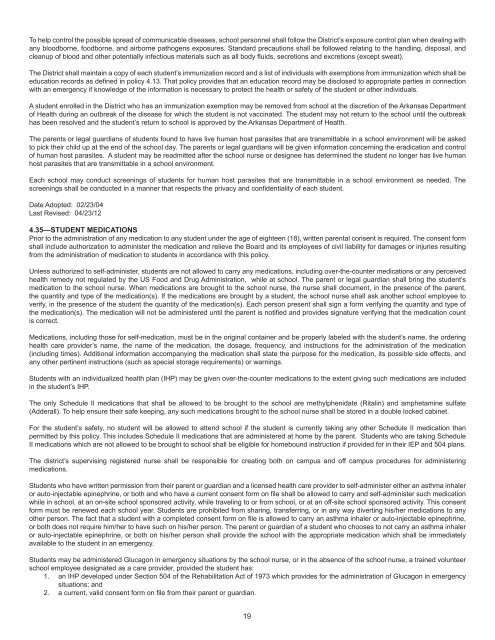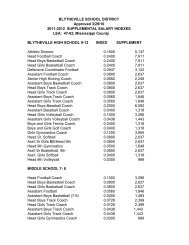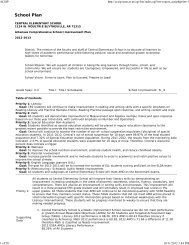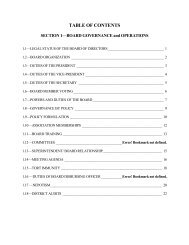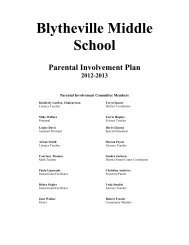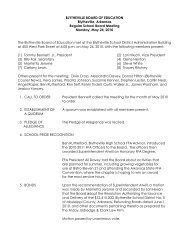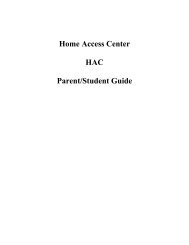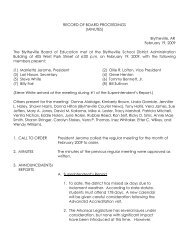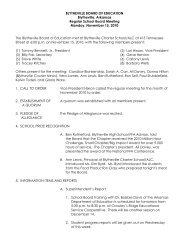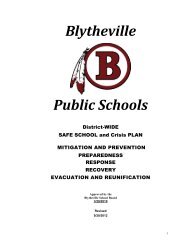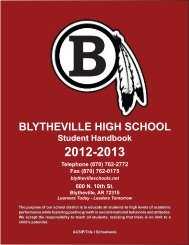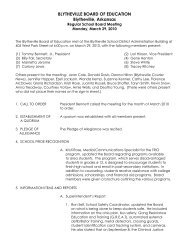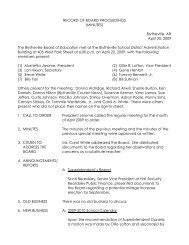Student Handbook - Blytheville Public Schools
Student Handbook - Blytheville Public Schools
Student Handbook - Blytheville Public Schools
You also want an ePaper? Increase the reach of your titles
YUMPU automatically turns print PDFs into web optimized ePapers that Google loves.
To help control the possible spread of communicable diseases, school personnel shall follow the District’s exposure control plan when dealing with<br />
any bloodborne, foodborne, and airborne pathogens exposures. Standard precautions shall be followed relating to the handling, disposal, and<br />
cleanup of blood and other potentially infectious materials such as all body fluids, secretions and excretions (except sweat).<br />
The District shall maintain a copy of each student’s immunization record and a list of individuals with exemptions from immunization which shall be<br />
education records as defined in policy 4.13. That policy provides that an education record may be disclosed to appropriate parties in connection<br />
with an emergency if knowledge of the information is necessary to protect the health or safety of the student or other individuals.<br />
A student enrolled in the District who has an immunization exemption may be removed from school at the discretion of the Arkansas Department<br />
of Health during an outbreak of the disease for which the student is not vaccinated. The student may not return to the school until the outbreak<br />
has been resolved and the student’s return to school is approved by the Arkansas Department of Health.<br />
The parents or legal guardians of students found to have live human host parasites that are transmittable in a school environment will be asked<br />
to pick their child up at the end of the school day. The parents or legal guardians will be given information concerning the eradication and control<br />
of human host parasites. A student may be readmitted after the school nurse or designee has determined the student no longer has live human<br />
host parasites that are transmittable in a school environment.<br />
Each school may conduct screenings of students for human host parasites that are transmittable in a school environment as needed. The<br />
screenings shall be conducted in a manner that respects the privacy and confidentiality of each student.<br />
Date Adopted: 02/23/04<br />
Last Revised: 04/23/12<br />
4.35—STUDENT MEDICATIONS<br />
Prior to the administration of any medication to any student under the age of eighteen (18), written parental consent is required. The consent form<br />
shall include authorization to administer the medication and relieve the Board and its employees of civil liability for damages or injuries resulting<br />
from the administration of medication to students in accordance with this policy.<br />
Unless authorized to self-administer, students are not allowed to carry any medications, including over-the-counter medications or any perceived<br />
health remedy not regulated by the US Food and Drug Administration, while at school. The parent or legal guardian shall bring the student’s<br />
medication to the school nurse. When medications are brought to the school nurse, the nurse shall document, in the presence of the parent,<br />
the quantity and type of the medication(s). If the medications are brought by a student, the school nurse shall ask another school employee to<br />
verify, in the presence of the student the quantity of the medication(s). Each person present shall sign a form verifying the quantity and type of<br />
the medication(s). The medication will not be administered until the parent is notified and provides signature verifying that the medication count<br />
is correct.<br />
Medications, including those for self-medication, must be in the original container and be properly labeled with the student’s name, the ordering<br />
health care provider’s name, the name of the medication, the dosage, frequency, and instructions for the administration of the medication<br />
(including times). Additional information accompanying the medication shall state the purpose for the medication, its possible side effects, and<br />
any other pertinent instructions (such as special storage requirements) or warnings.<br />
<strong>Student</strong>s with an individualized health plan (IHP) may be given over-the-counter medications to the extent giving such medications are included<br />
in the student’s IHP.<br />
The only Schedule II medications that shall be allowed to be brought to the school are methylphenidate (Ritalin) and amphetamine sulfate<br />
(Adderall). To help ensure their safe keeping, any such medications brought to the school nurse shall be stored in a double locked cabinet.<br />
For the student’s safety, no student will be allowed to attend school if the student is currently taking any other Schedule II medication than<br />
permitted by this policy. This includes Schedule II medications that are administered at home by the parent. <strong>Student</strong>s who are taking Schedule<br />
II medications which are not allowed to be brought to school shall be eligible for homebound instruction if provided for in their IEP and 504 plans.<br />
The district’s supervising registered nurse shall be responsible for creating both on campus and off campus procedures for administering<br />
medications.<br />
<strong>Student</strong>s who have written permission from their parent or guardian and a licensed health care provider to self-administer either an asthma inhaler<br />
or auto-injectable epinephrine, or both and who have a current consent form on file shall be allowed to carry and self-administer such medication<br />
while in school, at an on-site school sponsored activity, while traveling to or from school, or at an off-site school sponsored activity. This consent<br />
form must be renewed each school year. <strong>Student</strong>s are prohibited from sharing, transferring, or in any way diverting his/her medications to any<br />
other person. The fact that a student with a completed consent form on file is allowed to carry an asthma inhaler or auto-injectable epinephrine,<br />
or both does not require him/her to have such on his/her person. The parent or guardian of a student who chooses to not carry an asthma inhaler<br />
or auto-injectable epinephrine, or both on his/her person shall provide the school with the appropriate medication which shall be immediately<br />
available to the student in an emergency.<br />
<strong>Student</strong>s may be administered Glucagon in emergency situations by the school nurse, or in the absence of the school nurse, a trained volunteer<br />
school employee designated as a care provider, provided the student has:<br />
1. an IHP developed under Section 504 of the Rehabilitation Act of 1973 which provides for the administration of Glucagon in emergency<br />
situations; and<br />
2. a current, valid consent form on file from their parent or guardian.<br />
19


